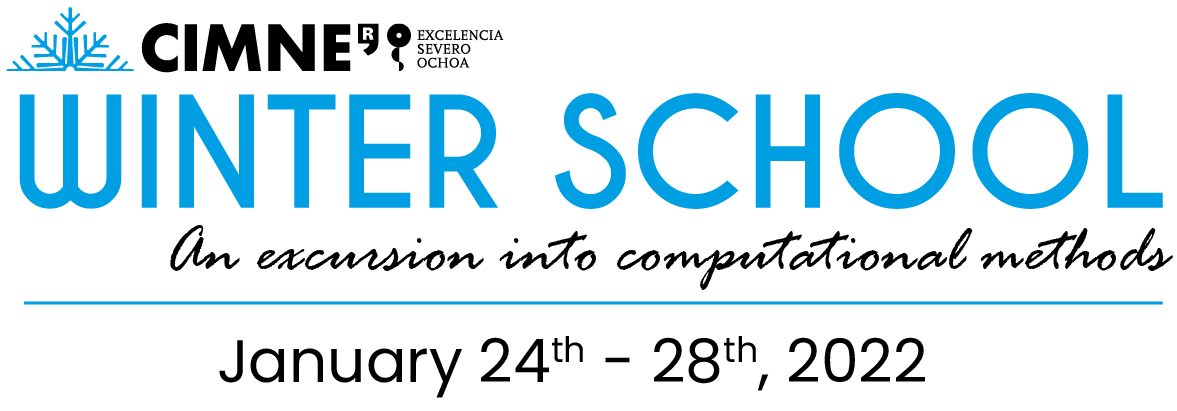

| Monday 24th | Tuesday 25th | Wednesday 26th | Thursday 27th | Friday 28th | |
| 9:15-9:30 | Opening CIMNE Winter School by the Organizing Committee | Closing CIMNE Winter School by the Organizing Committee | |||
| 9:30-11:00 |
Numerical Lineal Algebra (Theory) Alba Muixí |
FEM Basics (Theory) Ignasi de Pouplana |
High Performance Computing (Theory) Ricardo Rossi |
Optimization ( Theory) Gabriel Bugeda & Jordi Pons-Prats |
Machine Learning (Theory)
|
| 11:30-13:30 |
Numerical Lineal Algebra (Practice) Alba Muixí |
FEM Basics (Practice) Ignasi de Pouplana |
High Performance Computing (Practice) Ricardo Rossi |
Optimization (Practice) Gabriel Bugeda & Jordi Pons-Prats |
Machine Learning (Practice) Fernando Salazar |
| 14:30-16:00 |
Programming: Good Practice Rules (Practice) Sergio Zlotnik & Guillem Barroso |
Continnum Mechanics Oriol LLoberas (this session will be from 14:30 to 16:30 |
Bibliography Ruth Iñigo |
Oral Communication |
Written Communication Narges Dialami |
Speakers and brief description of the class contents:
NUMERICAL LINEAL ALGEBRA
Speaker: Alba Muixi
Description:
FEM BASICS
Speaker: Ignasi de Pouplana
Description: This course aims at giving a brief overview on the Finite Element Method. The first part reviews the theoretical aspects of the method applied on a 2D solid mechanics static problem, and the second part is devoted to show the different steps in the solution of a particular test case.
HIGH PERFORMANCE COMPUTING
Speaker: Riccardo Rossi
Description:
The course will provide a hint of loop-level parallelization models, of task-based models which
allow addressing complex concurrency problems, and of the MPI paradigm. A hint of other parallelization models will
also be provided.
OPTIMIZATION
Speaker: Gabriel Bugeda & Jordi Pons-Prats
Description:
MACHINE LEARNING
Speaker: Marino Arroyo & Irene Arias & Fernando Salazar
Description: Machine Learning (ML) is emerging as a powerful quantitative tool in data science and data engineering. It has proven its enormous usefulness across fields and disciplines - for instance during the current covid-19 pandemic - in extracting knowledge from big data and guiding decision making. In this session, we will discuss the basic mathematical concepts of ML from a practical engineering viewpoint and we will focus on several ML applications in data-driven modelling and engineering.
CONTINUUM MECHANICS
Speaker: Oriol Lloberas
Description: Continuum mechanics is an essential discipline for the understanding of motion, deformation and constitutive behaviour of any continuous medium. It transversally impacts many engineering fields such as solid and fluid mechanics. Within this course the basic knowledge on the description of motion and deformation are outlined together with the concept of stress. Balance principles valid for any continuous media will be enunciated and some basic notions on elastic solids and Newtonian fluids will be addressed.
PROGRAMMING: GOOD PRACTICE RULES
Speaker: Guillem Barroso & Sergio Zlotnik
Description: Best practices to reduce (at least a bit) the burden of programming: testing, version control, coding style, pair programming... these might smooth out your excursion into computer programs.
BIBLIOGRAPHY SEARCH:
Speaker: Ruth Iñigo
Description: During this session we will discuss how to structure your information search strategy and find relevant references for your research plan and your theses. We will also see and how to access and search Web of Science and Scopus databases, and some other information resources.
WRITTEN COMMUNICATION
Speaker: Narges Dialami
Description: This course develops students’ abilities to communicate science effectively in the real world starting with the key elements of clear and persuasive speaking, writing and exhibiting. The objective of the module is to help the students identify the important aspects of the preparation of scientific works, while improving their oral and written communication skills.
In this first session the course will focus on written skills.
ORAL COMMUNICATION
Speaker: Narges Dialami
Description: This course develops students’ abilities to communicate science effectively in the real world starting with the key elements of clear and persuasive speaking, writing and exhibiting. The objective of the module is to help the students identify the important aspects of the preparation of scientific works, while improving their oral and written communication skills.
In this first session the course will focus on oral communication skills.
